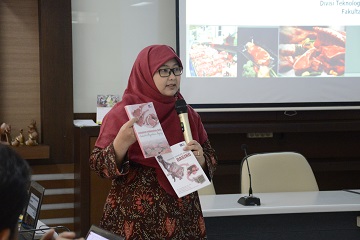It’s Time to Apply a Cold Chain System for the Better Quality of Meat

Animal products are one of the food sources that has various protein needed to build healthy and smart communities. “Nevertheless, animal-based food products are one of the products categorized as perishable products and potentially bring harm to consumers’ health. Therefore, special attention must be taken to address the health of meat from upstream to downstream through a long, good and healthy supply chain, “said Deputy Dean of Resources, Cooperation and Development, Faculty of Animal Husbandry, IPB University (IPB-U), Dr. Rudy Afnan.
The Faculty of Animal Science, IPB University in collaboration with the Indonesian Livestock Logistics Forum (FLPI) and the Indonesian Cooling Chain Association (ARPI) held a training with the theme “Cold Chain Logistics on Meat and Visits to Cold Storage”, Thursday-Friday (21- 22/2) at Dramaga Campus of IPB, Bogor.
Dr. Rudy said, the purpose of this activity is as a form of education and socialization in the handling of healthy and quality frozen meat, so that training or socialization is needed on the ways and steps to implement cold chains on frozen meat and their business prospects for stakeholders. Food products of animal, beseides checking their availability, must also be handled properly to be able to be beneficial and guaranteed to be healthy and safe for consumption.
Dr. Rudy added, the ability of cold chain management is needed to avoid high losses due to damage to livestock products, and to maintain product quality that is increasingly becomes a demand in the era of globalization. “One of the storage facilities that must be available to maintain the quality of perishable commodities is cold storage. The cold chain system is also able to maintain meat supply throughout the year when production figures are relatively stable and predictable. If the production is surplus, the surplus can be kept frozen and released when the demand increases, “said Dr. Rudy.
They Hope that this training can improve the ability of cold chain or meat chain management in meat products as to produce healthy frozen meat that has high quality for consumers.
The speaker from the Department of Animal Science Production and Technology (IPTP) IPB University, Prof. Dr. Irma Isnafia Arief explained about the supply chain of beef products. Meat is not only an agricultural commodity that has economic value, but is also essential for meeting the nutritional needed by Indonesian people, especially the young generation of the nation. However, consumer’s concern for the quality of meat is still not well and properly built. Meat with better quality is meat derived from a pattern of livestock cultivation that is healthy, does not pollute the environment, and is slaughtered humanely.
According to Prof Irma, beef is one of the food products that have nutritional value, the consumption needs of animal products are increasing along with population growth and community income, so that it is the responsibility of the government and company to ensure the availability of supply and distribution of products nationally. Beef is a livestock product that has economic value.
“In the supply chain in slaughterhouses that exist in Bogor Regency when the cows are ready to be cut or slaughtered, the beef will be sold out, approximately 80 percent is bought for meatballs restaurant, only 20 percent of beef purchased by households and others restaurants, “said Prof. Irma.
Prof. Irma said that the policy implications for improving the performance of meat supply chain management can be done through horizontally integrated, improving the performance of the implementation of meat supply chain management by involving small and medium / large scale businesses, and increasing vertical integration partially in a more holistic direction.
Prof. Irma emphasized that coordination and relation between parts of the entire supply chain of meat products needs to be taken seriously in order to improve the integration of the production process and integration between business actors for the better efficiency and competitiveness of local beef products. Based on this consideration, information is needed regarding of the performance of the livestock supply chain and beef.
“We hope that there will be harmonization of understanding among all government and private stakeholders regarding security and stability motivation, consumers related to prices and ease of access / availability, and livestock and poultry business actors related to business certainty, so that approach strategies involving all sectors can be more effective, “said Prof Irma.
Present as speakers were from Trisakti University Lecturers, Raden Didiet Rachmat Hidayat, PT Sierad Produce, Tbk, Sudarno and PT. Adib Cold Logistics Indonesia, Irene Natasha. (Jhn)



